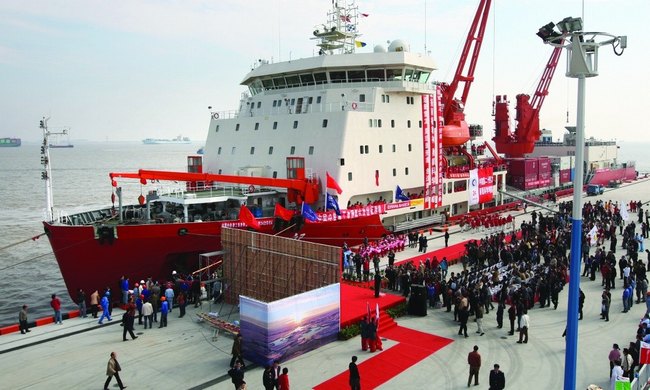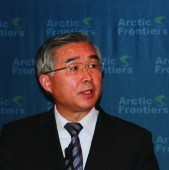
Chinese scientists leave Shanghai f0r a five month expedition to Antarctica. Photo: Wang Rongjiang / Imaginechina / SCANPIX
The Arctic and the issues surrounding it are fast assuming a central role on the global political agenda. The potential for fishing, for oil and gas exploration and later also for increasing transport linkages via the utilisation of the new ice-free sea-routes, which will open up as the polar ice melts, is great. This undoubtedly gives the region a new status.
 This was amply demonstrated by the fact that for the first time China officially participated in the latest Arctic Frontiers conference, held in Tromsø, one of the major international forums seeking to formulate the Arctic agenda. Previously, in 2008, the EU had assumed a similar role.
This was amply demonstrated by the fact that for the first time China officially participated in the latest Arctic Frontiers conference, held in Tromsø, one of the major international forums seeking to formulate the Arctic agenda. Previously, in 2008, the EU had assumed a similar role.
The Chinese ambassador to Norway, Tang Guoquiang, outlined the position of this growing world power underling that, for China, the two most important issues are climate change and the regulation of the sea lanes that will one day pass through the Arctic Ocean. For non-Arctic countries such as China these are the two topics which justify our having a say.
Canada, Denmark (including Greenland and the Faroe Islands) Iceland, Norway, Russia and the USA (Alaska) are the states bordering the Arctic Ocean. Until now they have all de facto agreed that the international convention on the law of the sea, signed in 1982 is adequate to regulate the territory - de facto rather than de jure because the US more or less on principle does not sign conventions like this. China also recognises the sovereignty of these five countries, added Hans Corell, the former advisor to the UN on international law.
At the same time, many are of the opinion that this convention does not go far enough since it does not provide any protection with respect to the industrial activities now being planned. Greenpeace is among the organisations articulating this particular point of view.
In respect of the development and implementation of policies in the region the Arctic Council is in many ways the most important forum here. This body is, in some ways, a very exclusive club only open for full membership to the six states already mentioned plus Finland and Sweden.
Others can however join as permanent participants or as observers. In the first group we find bodies representing indigenous peoples like the Saami Council. The observers are generally international organisations or non-Arctic states. France, Germany, Poland, Spain, the Netherlands and the United Kingdom have thus far joined on this basis It is in this context that China sees an opening, according to ambassador Tang Guoquiang
Could there be more to it? Some scientists think so, and they compare China's polar engagement to their ongoing quest for mineral resources in Africa. – There is no doubt that China is primarily interested in the potential resources of the Arctic notes Oran Young, an American specialist in polar science (The Guardian Weekly 12.02.10).
Indeed, China has mounted three polar expeditions since 1999 with a forth planned for this year. Part of this Chinese engagement is related to the international debate on climate change. Having your own data will undoubtedly be of value in this context.
The Arctic Frontier conference was held during the period 24-29 January and had 750 registered participants from the political, scientific, defence, industrial and trade sectors. It is arranged as a joint venture between, among others, the University of Tromsö, the oil-company Conoco-Philips and the regional authorities of the county of Troms.
By Odd Iglebaek